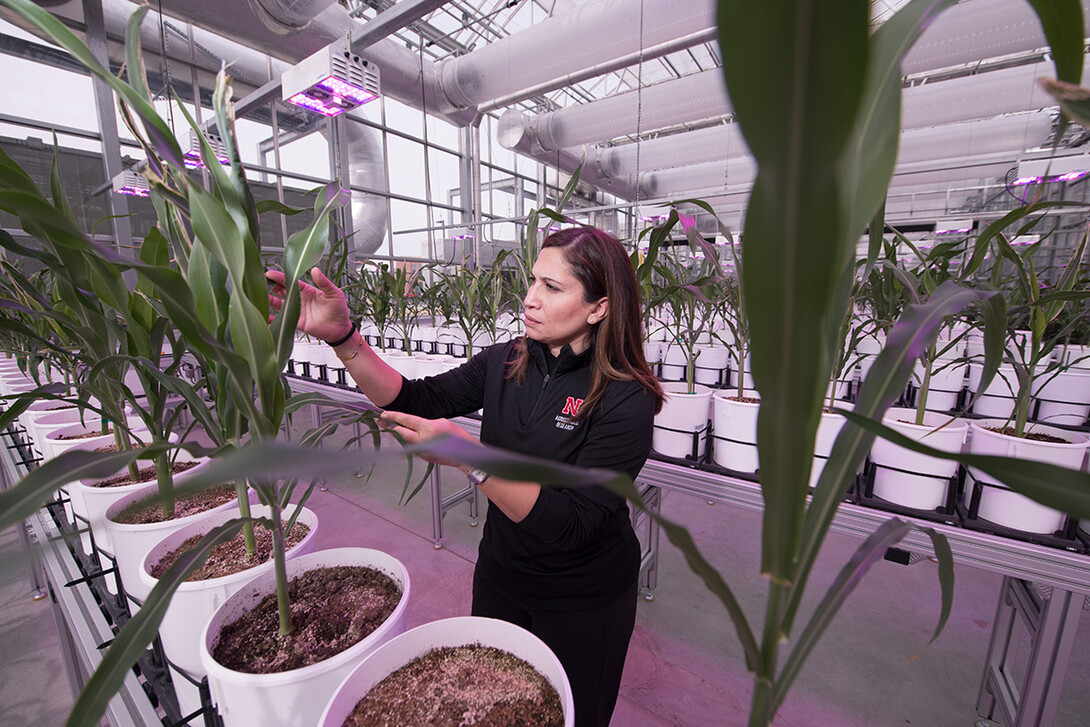
Defense of the United States is an undertaking that requires the help of experts from a wide array of obviously related disciplines — physics, engineering, computer science, political science and more. One discipline that might not immediately come to mind is plant ecophysiology. But the University of Nebraska–Lincoln’s Tala Awada is leading the way.
Awada, a physiological plant ecologist and associate dean of the Agricultural Research Division in the Institute of Agriculture and Natural Resources, is a National Strategic Research Institute Fellow, and is bringing her discipline — and others throughout IANR — forward for U.S. national security.
Recently, Awada co-led a partnership between NSRI and IANR to assist with the development of a new focus area within NSRI’s research portfolio — food, agriculture and environment security. The depth of her plant ecophysiology expertise and study of global ecosystems was essential to her role, as was her understanding of the university’s capabilities and talents. She found that the NSRI work differs from what she is used to and this has provided opportunities to yet again expand her skills.
“My own research is always curiosity-based,” she said. “We’re always looking at the outcome of research and then developing our next questions. Work with NSRI has been very action-driven. We have specific tasks based on problems that need to be solved. We do some of this in academic research, but not at the same speed.”
The need for plant and environmental research in national security may not be immediately apparent, but the environment and the world’s ability to produce food is incredibly important. War can put that stability at risk. The war in Ukraine and its impact on food security is, of course, one case in point.
“Many countries in the Middle East and Africa import 50 to 90% of their wheat from Ukraine,” Awada said. “Consequently, the Russia-Ukraine conflict has had a significant impact on the availability and price of food in those regions.”
And a direct land war isn’t the only security threat to food production.
“Natural disasters, drought, climate change or even cyberattacks are all factors that would significantly disrupt food production at a regional scale,” Awada said. “Technology in the agricultural sector is moving faster than the ability to defend it.”
Awada is intimately familiar with the factors necessary to provide nutritious food for a nation as expansive as the United States. For more than 20 years, she has participated in correlated transdisciplinary research for Nebraska U — an institution known for 150 years of agricultural research expertise. Awada’s research focuses include climate, vegetation cover change, invasive species, food security, digital plant science and other evolving agricultural topics. She is fascinated with the study of how plants interact with their environments, why certain plants persist in some geographic areas and not in others, and factors allowing specific species to thrive in specific locales.
A great deal of work goes into organizing an initiative like the new NSRI focus area, Awada explained, and it has further deepened her love for and curiosity of her discipline and field of study.
“All of this — it doesn’t feel like a job for me,” she said. “I continue to enjoy doing research, mentoring students and launching new initiatives. Every discovery leads to another question, and I just can’t seem to stop.”
As agriculture moves increasingly into the digital age, climate and food security are taking center stage as critical considerations in everything from water scarcity to modern warfare.
Threats to ecosystems and food production may be on the rise, but brilliant minds like Awada’s are doing the work to best ensure the agricultural, food and environmental safety of Americans.
“The leadership provided by Dr. Awada and IANR has been and will continue to be essential to bringing this research focus area to fruition,” said Maj. Gen., USAF (Ret.) Rick Evans. “We are grateful for her creative vision, unique perspective, deep expertise and enthusiasm to invite colleagues from across the University of Nebraska System into the fold. When you’re stepping into new territory like this, attacking a new and important national security mission, you need someone exactly like Dr. Awada — an expert who is curious, innovative, passionate and energetic.”







